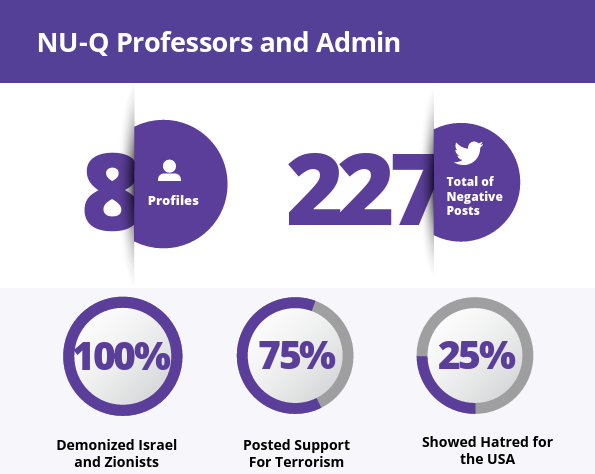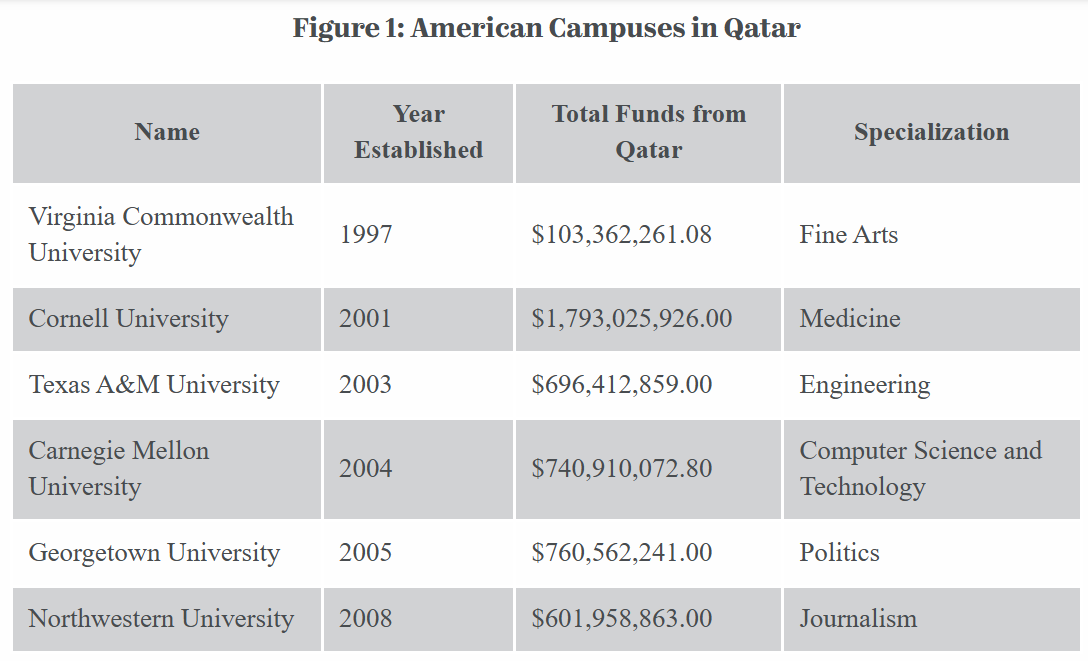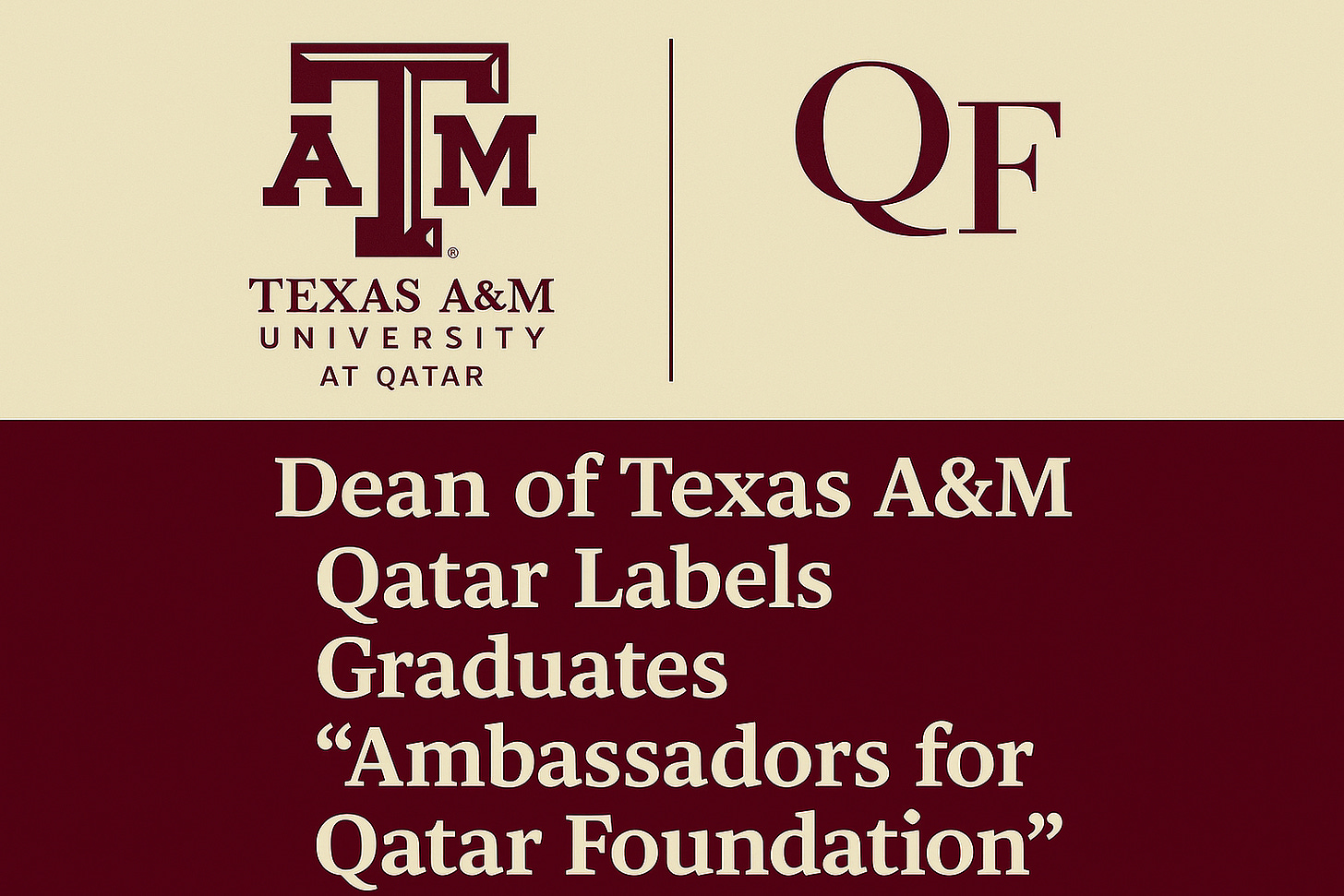Dean of Texas A&M in Qatar Calls Graduates “Ambassadors for the State of Qatar”
Texas A&M Qatar graduated 155 engineers in Doha this weekend. The dean called them "ambassadors for Qatar," demonstrating how Qatar sees US universities locally as part of its broader state agenda
Over the weekend, Texas A&M University at Qatar celebrated the graduation of 155 engineers, with the school’s dean declaring the graduates “ambassadors for Qatar Foundation and the State of Qatar.” This symbolic language underscores a deeper concern of Qatar’s aggressive financial investments in elite U.S. universities like Cornell, Northwestern, and Georgetown. These partnerships have been tied to allegations of rising antisemitism, opaque foreign funding, and efforts to manipulate public discourse through education and media.
Qatar Foundation’s Longstanding Influence Over U.S. Education
Since the early 2000s, Qatar has used its state-funded Qatar Foundation to bankroll branch campuses of top American universities in Doha. According to a study by the National Association of Scholars, institutions such as Weill Cornell Medicine-Qatar (WCM-Q), Northwestern University in Qatar (NU-Q), and Georgetown University in Qatar (GU-Q) have collectively received billions of dollars. On paper, these partnerships promote global education. In practice, they often come with strings attached - including influence over curricula, research, and campus values that may conflict with U.S. democratic ideals.
Northwestern’s NU-Q campus is directly tied to Al Jazeera, Qatar’s state-run media outlet. Graduates have gone on to work at major Western media institutions, some carrying anti-Israel and even pro-terror rhetoric. The watchdog company Canary Mission reports that some NU-Q alumni and professors have expressed admiration for Hitler or promoted calls for Israel’s destruction. This growing cadre of journalists has the power to shape Western public opinion while subtly advancing Doha’s interests.

At GU-Q, events have featured figures with ties to designated terrorist organizations, and a 2025 panel discussion accused Israel of genocide while omitting mention of Hamas atrocities. These activities associated with Qatari campuses reveal an ideological alignment with the Qatari regime’s political narrative, rather than balanced academic discourse.
The Cost of Qatari Billions
According to a 2024 report by the Institute for the Study of Global Antisemitism (ISGAP), Cornell received nearly $2 billion from Qatari sources—much of it undisclosed as required by federal law. The report revealed alarming clauses in contracts, including provisions that may grant Qatar access to student data and intellectual property. Worse, Cornell and Northwestern have been embroiled in antisemitism scandals since Hamas’s October 7 massacre. Professors have praised terrorist attacks, Jewish students have reported harassment, and some alumni have justified violence against Israelis. The funding trail consistently leads back to Qatar—a known sponsor of Hamas.
Legal Violations and a Federal Wake-Up Call
Both Cornell and Northwestern were recently hit with Department of Education funding freezes totaling nearly $1.8 billion due to failures to disclose foreign contributions and their handling of antisemitism on campus. These actions reflect a long-overdue shift in federal oversight. Violations of Section 117 of the Higher Education Act - which mandates disclosure of foreign gifts - reveal an alarming lack of accountability in safeguarding academic integrity.

In an April 23rd statement issued in response to President Trump’s six education-related Executive Orders signed earlier in the week, Education Secretary Linda McMahon named Qatar as a key source of unchecked foreign influence, warning that it had funneled billions into U.S. universities to shape campus narratives and access taxpayer-funded research. Her remarks signal a growing federal effort to rein in these entanglements.
Looking Ahead: Reassessing Foreign Ties in Higher Education
The Texas A&M Qatar graduation and broader partnerships with institutions like Cornell, Northwestern, and Georgetown reflect how Qatar has embedded itself in key areas of U.S. higher education. As federal scrutiny increases and campuses face growing pressure to disclose foreign ties, the long-term impact of these relationships warrants close examination.




Is it too late, too impossible to roll back this poisonous tide? The damage already done must be incalculable.
And why would Qataris graduating with engineering degrees from Texas A&M and then acting as ambassadors for Qatar be a bad thing, exactly? Do mechanical engineers make you feel unsafe or are they inherently antisemitic?
You should be warned that an over-reliance on Hasbara for your “intellectual” inputs leaves you vulnerable to being asked questions like this.